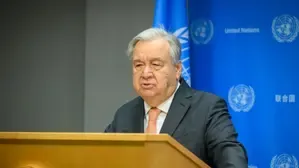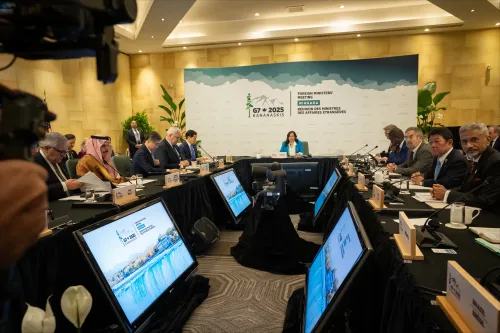Guterres Raises Alarm on Trade War Recession, Remains Hopeful

Synopsis
Key Takeaways
- Guterres warns against the dire consequences of a potential recession.
- Trade wars result in losses for all involved parties.
- Vulnerable developing nations are at heightened risk.
- The WTO remains a crucial player in global trade.
- China and Canada are pursuing dispute resolutions with the US.
United Nations, April 9 (NationPress) In light of growing concerns regarding the possibility of a recession stemming from the trade war, UN Secretary-General Antonio Guterres expressed his sincere hope that such an event will be avoided, citing the severe implications it would have for the world's most impoverished populations.
“I sincerely hope that we will not experience a recession, as it would have dramatic consequences, particularly for those living in poverty,” he stated on Tuesday, just hours before President Donald Trump’s reciprocal tariffs were set to take effect.
“Trade wars are incredibly detrimental. No one emerges victorious from a trade war; the fallout affects everyone,” he remarked while addressing the media.
He further articulated his concerns, saying, “My greatest apprehension is for the most vulnerable developing nations, where the repercussions will be especially severe.”
Trump has implemented tariffs amounting to 104 percent on China, effective at midnight Wednesday, prompting Beijing to announce retaliatory tariffs of 34 percent.
The UN Conference on Trade and Development (UNCTAD) acknowledged that the necessity for trade reform is evident.
UNCTAD Secretary-General Rebecca Grynspan remarked, “Global trade regulations must adapt to meet contemporary challenges, but this evolution must prioritize predictability and development, safeguarding the most vulnerable.”
“This moment calls for collaboration, not escalation,” she asserted.
Angela Ellard, Deputy Director-General of the World Trade Organisation (WTO), indicated that preliminary assessments suggest that the latest tariff actions taken by the US and others could result in a contraction of global merchandise trade volumes by approximately one percent this year.
This marks a significant downward adjustment from the previous forecast of three percent growth, a decline of nearly four percent.
Despite efforts to undermine the WTO framework, Ellard emphasized that 74 percent of global trade continues to operate under WTO Most-Favoured-Nation (MFN) conditions.
This highlights the ongoing relevance of the WTO and the effective functioning of the multilateral system, she noted.
According to the WTO, both China and Canada have initiated procedures to address their disputes with the US.
They have requested consultations under the WTO framework, allowing 60 days for negotiations to avert litigation.
If negotiations are unsuccessful, they may seek adjudication by a panel.









